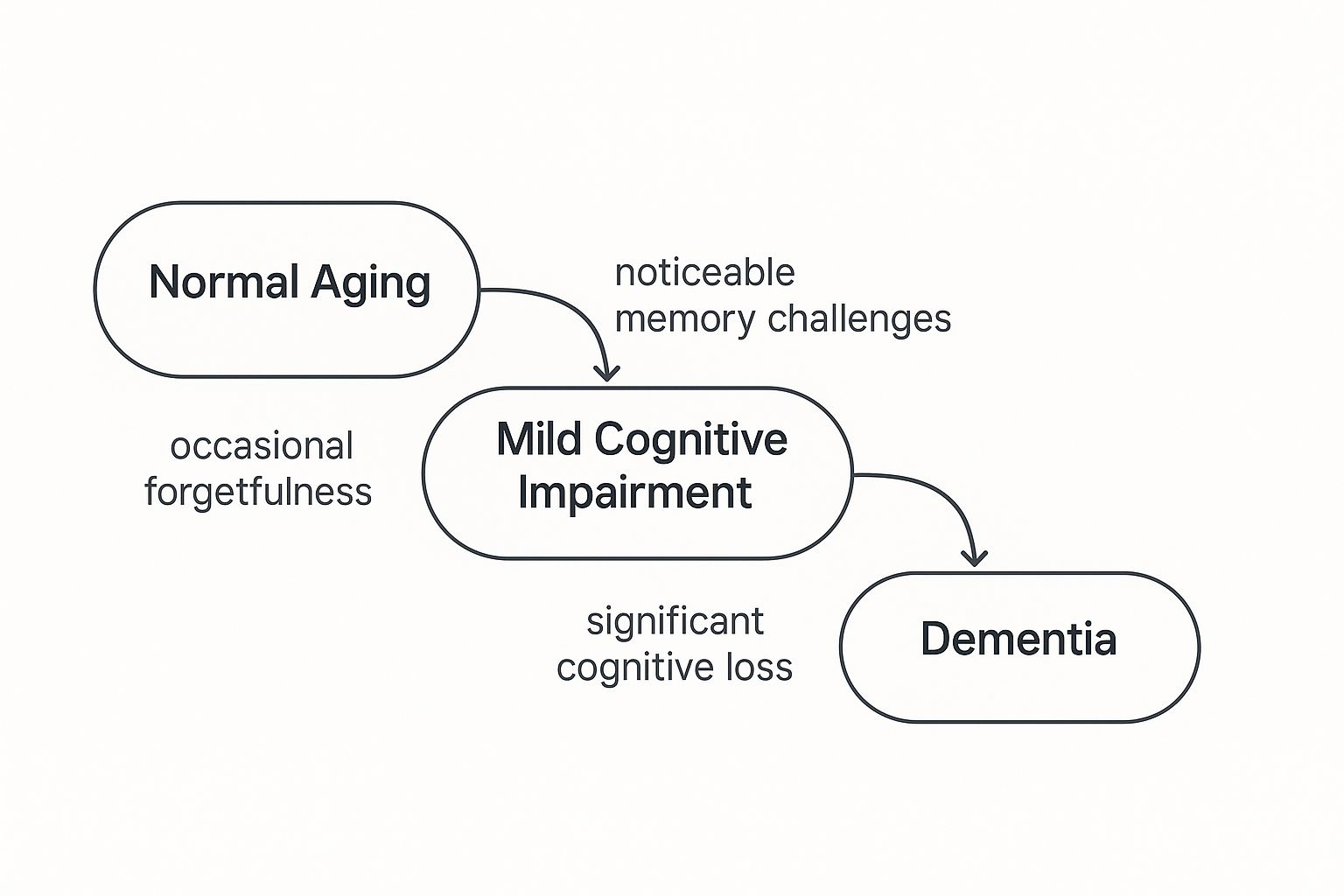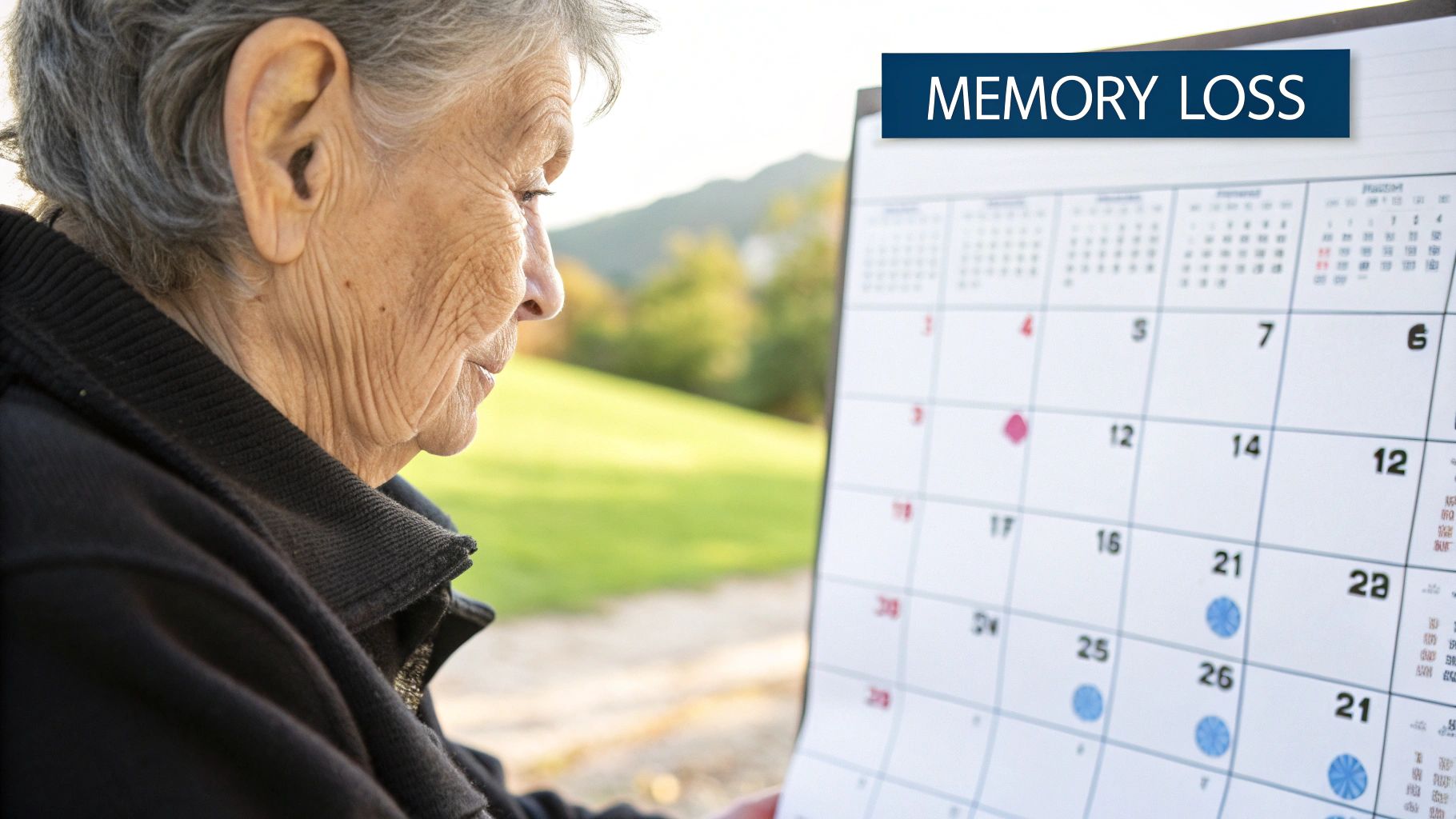We've all had those moments. You walk into a room and completely forget why you're there. You can't quite put a name to a familiar face. For most of us, these little memory blips are just a normal, harmless part of getting older.
But what happens when these moments start to become more frequent and more frustrating? This is where we start talking about cognitive decline. It's more than just occasional forgetfulness; it's a noticeable and persistent dip in your mental abilities, like memory, thinking, and reasoning, that starts to interfere with your daily life.
Demystifying Cognitive Decline
Think of your brain as a bustling, well-organised city. Throughout your life, you've built intricate road networks for memories, skills, and knowledge. In normal ageing, you might hit an occasional traffic jam or forget a shortcut – a temporary blip, but you still know how to get around.
Cognitive decline, on the other hand, is like the city's entire traffic management system starting to break down. It's not just one red light; entire routes become confusing, familiar landmarks seem new, and navigating tasks that used to be second nature—like managing your finances or following a complex conversation—suddenly feels like a struggle.
This image helps to show the journey from simple, age-related changes to more significant cognitive loss.

As you can see, it's a spectrum. There's a middle ground, often called mild cognitive impairment (MCI), which sits between the normal forgetfulness of ageing and more serious conditions.
Why Knowing the Difference is So Important
Learning to spot the difference between everyday memory lapses and a consistent pattern of decline is the single most powerful first step you can take for your long-term brain health. It helps you understand when a small concern might be worth a conversation with a professional.
When you can tell them apart, you are empowered to:
- Spot meaningful changes in yourself or a loved one without panicking over every misplaced set of keys.
- Seek advice early, which is crucial because many underlying causes of these symptoms can be managed or even addressed.
- Proactively adopt lifestyle changes that are known to support and build a more resilient brain for the future.
It can be tough to know what's 'normal' and what might be a sign of something more. This table breaks down some common examples to help you see the difference.
Normal Aging vs Potential Cognitive Decline
| Symptom | Normal Age-Related Change | Potential Sign of Cognitive Decline |
|---|---|---|
| Forgetting things | Occasionally forgetting names or appointments but remembering them later. | Frequently forgetting recent events or important information, and not recalling them later. |
| Misplacing items | Losing things from time to time, like keys or glasses, but being able to retrace steps to find them. | Putting items in unusual places (e.g., car keys in the fridge) and having no memory of putting them there. |
| Problem-solving | Sometimes needing a bit more time to manage a budget or follow a familiar recipe. | Consistent difficulty with planning, following steps, or working with numbers, making daily tasks challenging. |
| Word finding | Occasionally struggling to find the right word in a conversation. | Frequent problems with words, stopping mid-sentence, or calling things by the wrong name. |
| Decision making | Making a poor decision once in a while. | Showing consistently poor judgment, especially with money, or neglecting personal hygiene. |
| Mood and personality | Feeling irritable when a routine is disrupted. | Noticeable changes in mood, becoming confused, suspicious, anxious, or easily upset in familiar situations. |
Seeing these side-by-side makes it clearer. Normal ageing involves minor hiccups, whereas cognitive decline involves a more fundamental breakdown in the brain’s ability to function smoothly.
The key takeaway is this: cognitive decline is not an inevitable part of getting older. It's a specific condition that signals your brain could use some extra support.
By demystifying what cognitive decline truly is, we can move away from fear and step into a place of empowerment, focusing on real, actionable strategies to protect our cognitive health for years to come.
Recognising the Early Signs of Cognitive Decline
Spotting the early signs of cognitive decline isn't about one single, dramatic moment of forgetfulness. It's much more subtle than that. Think of it less like a sudden power cut and more like the lights gradually dimming in a room – the change can be so slow that it's easy to miss or dismiss at first.

This awareness is more important than ever. A landmark 2025 study, the 'UK Cognitive Health Census 2025', found that more than one in three Britons over 40 are already showing early, detectable signs of cognitive decline or have biomarkers pointing to a heightened risk. It’s a clear sign that this is a conversation for many of us, not just the elderly.
Moving Beyond Simple Memory Loss
While we often jump to memory loss, the truth is that the earliest signs frequently pop up in other areas of our daily lives. Paying attention to these small but persistent shifts, either in yourself or a loved one, is the first and most powerful step you can take.
Here are a few real-world examples of what to look out for:
- Difficulty with familiar tasks. Are you struggling to follow a recipe you’ve made a hundred times? Do you find it hard to manage a monthly budget that used to be second nature?
- Challenges with planning or problem-solving. Have you noticed it's harder to put together a simple shopping list, plan a family get-together, or follow the plot of your favourite TV show?
- Frequently losing things and being unable to retrace steps. It’s one thing to misplace your keys. It’s another entirely to consistently put them in strange places, like the sugar bowl, and have absolutely no memory of doing it.
- Changes in mood or personality. Look for increased irritability, anxiety, or suspicion that seems to come out of nowhere. Sometimes, you might notice yourself becoming more withdrawn in social situations you once loved.
These signs are often more telling than simply forgetting a name now and then. They point to a shift in the brain's executive functions—its ability to organise, plan, and carry out tasks. For many, these subtle struggles show up as a constant feeling of mental cloudiness, which you can learn more about by reading our detailed guide on the symptoms of brain fog.
The goal isn't to create alarm over every small lapse in memory. It's about building awareness around consistent patterns. Noticing these shifts early is your best tool for seeking timely advice and finding effective ways to manage brain health.
By recognising these concrete examples, you’re in a much better position to know when it might be time to have a chat with a doctor. Early detection really is key; it opens the door to support, interventions, and proactive strategies to protect your brain for the long haul.
Understanding the Causes and Risk Factors
To protect your brain, you need to know what you're up against. Think of your brain’s health as a complex recipe with lots of different ingredients. Some of these are set in stone, but many others are lifestyle factors you have direct influence over, every single day.

Here, we'll separate the risks you can't change from the powerful ones you can. The goal is to show you just how much your daily choices impact your long-term brain health, setting the stage for the practical, actionable strategies we'll cover next.
The Factors You Cannot Change
A couple of risk factors for cognitive decline are simply a part of life and are completely out of our hands. It’s worth acknowledging them before we dive into the areas where you can make a genuine difference.
- Age: The single biggest risk factor is simply getting older. As the years go by, natural changes in the brain’s structure and function make it more vulnerable.
- Genetics: Family history can definitely play a role. Certain genes, like APOE4, are known to increase the risk for conditions like Alzheimer's disease, a major cause of severe cognitive decline.
While these factors are important, they are not a life sentence. They just make it even more crucial to focus on the lifestyle elements you can manage.
The Powerful Risk Factors You Can Control
This is where you can take back control. Your daily habits and health choices create the very environment your brain operates in. The wrong choices can create a state of chronic stress or inflammation, forcing your brain to fight an uphill battle just to function. You can read more about this in our guide on what causes brain fog.
Here are the key lifestyle risks you can do something about today:
-
Poor Cardiovascular Health: Things like high blood pressure, high cholesterol, and diabetes are serious threats. They damage the delicate blood vessels that deliver vital oxygen and nutrients to your brain, effectively starving it of what it needs to thrive. Your action step: Schedule a check-up to know your numbers and discuss heart health with your GP.
-
Lack of Physical Activity: A sedentary lifestyle is a huge red flag. Exercise is fantastic for boosting blood flow to the brain, encouraging the growth of new neurons, and calming inflammation. Your action step: Aim for a 20-minute brisk walk today.
-
Unhealthy Diet: A diet loaded with processed foods, unhealthy fats, and sugar fuels inflammation and oxidative stress, both of which are incredibly damaging to your brain cells. Your action step: Swap one processed snack for a piece of fruit or a handful of nuts.
-
Poor Sleep Quality: Sleep is your brain’s dedicated cleaning crew. During deep sleep, it gets to work clearing out toxins and locking in memories. Consistently bad sleep throws a spanner in the works of this critical process. Your action step: Turn off screens an hour before bed tonight.
-
Chronic Stress: Long-term stress floods your system with cortisol, a hormone that can damage and even kill cells in the hippocampus – the brain’s memory centre. Your action step: Take five minutes for deep breathing exercises right now.
"Your lifestyle is not just a part of your brain health strategy—it is the strategy. Every choice you make, from the food you eat to the quality of your sleep, directly contributes to your cognitive resilience."
The impact of these factors is massive. Dementia, a severe form of cognitive decline, is already a major public health issue in the UK, affecting an estimated 850,000 people. Without a bigger focus on prevention, this number is expected to hit over 1 million by 2025. It’s these very lifestyle factors that hold the key. You can learn more about these midlife approaches to reduce dementia risk on GOV.UK.
Understanding what causes the problem is the first, most powerful step towards building a sharper, more resilient mind for the future.
Actionable Steps to Protect Your Brain Health
Knowing the risks of cognitive decline is one thing, but actively building a more resilient brain is where the real power lies. And the great news? Your daily choices have a massive impact. You can take concrete, evidence-based steps to safeguard your mental sharpness for years to come, moving from simple awareness to a personal action plan.

This isn't about finding a single magic bullet. Instead, think of it as forging a protective shield for your brain, built from several key lifestyle habits all working in harmony.
Nourish Your Brain With the Right Foods
What you eat directly fuels your brain. Adopting a brain-healthy eating pattern, like the MIND diet, can make a huge difference. This diet cleverly combines the best bits of the Mediterranean and DASH diets, with a specific focus on foods known to support cognitive function.
The core principle is refreshingly simple: prioritise whole, nutrient-dense foods while cutting back on processed items, red meat, and sugary treats. Here are the key food groups to build your meals around:
- Leafy Green Vegetables: Aim for at least six servings a week. Think spinach, kale, and rocket, which are bursting with brain-protective nutrients.
- Berries: Enjoy berries at least twice a week. Blueberries, in particular, are packed with flavonoids that help fight off oxidative stress in the brain.
- Nuts and Seeds: A handful most days of the week provides healthy fats, antioxidants, and vitamin E – all crucial for healthy brain cells.
- Oily Fish: Try for at least one serving of fish like salmon or mackerel per week to get a solid dose of omega-3 fatty acids.
Move Your Body to Boost Your Mind
Regular physical activity is one of the most powerful tools we have for staving off cognitive decline. Exercise gets more blood flowing to the brain, calms inflammation, and even triggers the release of factors that encourage the growth of new brain cells.
For the best results, aim for a good mix of activities:
- Aerobic Exercise: Getting at least 150 minutes of moderate-intensity activity like brisk walking, cycling, or swimming each week gets your heart pumping and delivers more precious oxygen to your brain.
- Strength Training: Don't forget to mix in resistance training a couple of times a week. This helps maintain muscle mass and improves your metabolic health, both of which are strongly linked to better brain function.
The most effective exercise routine is always the one you actually stick with. Find activities you genuinely enjoy to make movement a sustainable and rewarding part of your life.
Prioritise Sleep and Manage Stress
Sleep isn't a luxury; it's your brain's essential maintenance period. During deep sleep, your brain gets to work clearing out toxins that can build up and contribute to cognitive issues down the line. Aim for a solid 7-9 hours of quality sleep per night by setting up a consistent bedtime routine and creating a truly restful environment.
Chronic stress is just as damaging, flooding your brain with cortisol, a hormone that can wreak havoc on your memory centres. Make time to incorporate stress-management techniques like mindfulness, deep breathing exercises, or simply spending time in nature. For those looking for a little extra support, exploring various supplements for mental clarity can also be a helpful addition to a balanced wellness routine.
Your Weekly Brain Health Action Plan
Putting this all into practice can feel overwhelming, so here’s a sample weekly plan to get you started. Think of it as a template you can tweak to fit your own life. The goal is consistency, not perfection!
| Day | Diet Goal | Physical Activity | Mental Stimulation | Social Connection |
|---|---|---|---|---|
| Monday | Add a large leafy green salad to your lunch. | 30-min brisk walk. | Do a 15-min crossword puzzle. | Call a family member just to chat. |
| Tuesday | Snack on a handful of almonds and walnuts. | Bodyweight strength training (20 mins). | Listen to an educational podcast. | Have lunch with a work colleague. |
| Wednesday | Try a new recipe with oily fish like salmon. | 45-min cycle or swim. | Read a chapter of a book. | Attend a local club or group meeting. |
| Thursday | Enjoy a bowl of mixed berries with breakfast. | Bodyweight strength training (20 mins). | Play a brain-training game on your phone. | Send a thoughtful message to a friend. |
| Friday | Go meat-free for one meal. | 30-min dance or active hobby. | Learn 5 new words in another language. | Plan a weekend outing with friends. |
| Saturday | Cook a meal from scratch using fresh vegetables. | Long walk in a park or nature. | Visit a museum or art gallery. | Host a small get-together or dinner. |
| Sunday | Prepare healthy snacks (like chopped veg) for the week. | Gentle yoga or stretching. | Plan your week ahead. | Have a meaningful conversation with a loved one. |
This table is just a guide to show how small, daily actions add up. The key is to find activities you enjoy across all these pillars of health, making it easier to build a brain-protective lifestyle that lasts.
When and How to Seek Professional Advice
Noticing the signs of cognitive decline is the first crucial step, but knowing what to do next is just as vital. If you or a loved one are worried about persistent changes in memory or thinking, it’s time to take action. Getting professional advice can bring clarity, rule out other potential causes, and get you on the right track.
Deciding to see a doctor might feel like a big step, but it's the most powerful one you can take. This is especially true when you realise how common early cognitive issues are becoming. A recent report revealed that over one in four (27%) Britons are expected to face a significant drop in cognitive function before even reaching state pension age, often starting as brain fog or memory slips. You can discover more insights from the 2025 'UK Brain Health & Ageing Report' to get a better sense of the scale of this issue.
Preparing for a Productive Appointment
To get the most out of your consultation, a little bit of preparation can make all the difference. Don't just walk in saying, "I'm a bit forgetful." Try to paint a clearer picture for your doctor.
Here are a few tips to help you get ready:
- List specific examples: Jot down recent moments of memory loss, confusion, or trouble with familiar tasks. For example, "Last Tuesday, I couldn't remember how to use the microwave," is far more helpful than a vague "My memory is bad."
- Note the timeline: When did you first notice these changes starting? Have they gotten more frequent or worse over the last six months?
- Bring a list of all medications: This should include everything—prescriptions, over-the-counter drugs, and any supplements you're taking. Some medications can have side effects that look a lot like cognitive decline.
Understanding the Diagnostic Process
Once you're at your appointment, your doctor will likely start a process of elimination to figure out what's really going on. The aim is to build a complete picture of your health.
A diagnosis isn't just about spotting a problem; it's about finding the cause. So many different things can affect our cognition, and a proper assessment makes sure nothing is missed—including easily fixable issues.
The journey to a diagnosis usually involves a few key steps:
- Cognitive Assessments: These aren't scary exams. They are usually simple sets of questions and tasks, like the Montreal Cognitive Assessment (MoCA), designed to check things like memory, language, and attention.
- Blood Work: A full blood test is essential. It helps rule out reversible causes of cognitive symptoms, such as vitamin B12 deficiencies, thyroid problems, or even low-grade infections.
- Brain Imaging: In some situations, your doctor might suggest an MRI or CT scan. These images can help spot any structural changes in the brain, like signs of a previous stroke or a tumour.
Seeking help early leads to much better support and outcomes, giving you the knowledge you need to manage your brain health head-on.
Your Questions About Cognitive Decline, Answered
When you start digging into cognitive decline, it’s only natural for a lot of questions to pop up. It can feel like a complex topic, so let's break down some of the most common concerns with clear, straightforward answers.
Is Cognitive Decline the Same as Dementia?
This is a really important one to get straight. Think of cognitive decline as a very wide spectrum. On one end, you might have those mild, noticeable slips in memory, and on the other, more serious challenges.
Dementia sits at the most severe end of that spectrum. It's the point where cognitive decline has become so advanced that it genuinely gets in the way of someone living independently or handling their daily life. So, while everyone with dementia has cognitive decline, not all cognitive decline leads to dementia. Many people just experience mild changes that never get worse.
Can Cognitive Decline Be Reversed?
The honest answer? It really depends on what’s causing it. If the decline is from irreversible brain cell damage, like from Alzheimer’s disease, that specific damage can't be undone.
But here's the hopeful part: many cognitive issues aren't caused by permanent damage at all. They can be triggered by things like chronic stress, not getting enough sleep, nutritional gaps (like low vitamin B12), or even side effects from medication. Tackling these root causes often leads to massive improvements, sometimes even a complete turnaround in mental clarity.
The key takeaway is this: never assume cognitive symptoms are permanent without getting checked out by a doctor. So many contributing factors are within your power to change, which makes getting an early assessment absolutely vital.
At What Age Should I Start Protecting My Brain?
The short answer is: right now. Looking after your brain isn't just something to think about when you're older; it's a lifelong project. The habits you build in your 30s, 40s, and 50s are literally laying the groundwork for how well your brain works in the years to come.
Think of it like saving for retirement. The earlier you start investing in healthy habits, the bigger your "cognitive reserve" becomes. Making brain-healthy choices today has a massive impact on how resilient you are to cognitive decline later on.
What Is the Most Important Action I Can Take?
While it’s always best to take a balanced approach—good diet, mental stimulation, managing stress—there's one thing that research consistently shows is a real heavy hitter: regular physical exercise.
Getting your body moving is one of the single most powerful things you can do for your brain. It boosts blood flow, dials down inflammation, and triggers the release of growth factors that help keep brain cells healthy and even forge new connections. If you're going to start with just one thing, making consistent physical activity a priority is a fantastic place to begin.
For anyone looking to give their cognitive health and overall vitality a little extra support, Oji Shilajit offers a natural boost. Our enhanced gummies are packed with over 85 trace minerals and adaptogens to help promote mental clarity, natural energy, and better stress management. Find out how you can restore essential nutrients the easy way by visiting https://myoji.co.uk.








